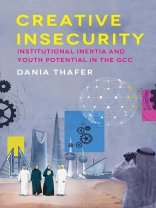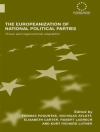The Middle East is experiencing the world’s most prominent youth bulge. Yet many MENA economies’ institutional designs, both formal and informal, favour the power of business elites, systematically discriminating against young people joining the workforce or opening businesses, and thus limiting their ability to contribute to innovation.
Large youth populations can be a boon or a curse: nurtured and integrated, they can jumpstart stratospheric growth; but if alienated and confined, they can drain a society politically and economically. The Gulf Cooperation Council countries are no exception to this perilous dilemma. This book explores the problem through a new concept, ‘creative insecurity’: a state’s subjection to an institutional ecosystem that is suppressing opportunities for innovation—to the extent that it is causing economic and political vulnerabilities, which in turn threaten national security.
Creative insecurity threatens the longevity of many states today. In this original, incisive study, Dania Thafer argues that GCC member-states should make it a national security imperative to cash in their demographic dividend, by averting the deleterious effects of ill-disposed elite politics. Investing in an innovation ecosystem that harnesses the talent of the youth majority will be crucial for the GCC’s successful transition to the post-oil era.
Circa l’autore
Dania Thafer is Executive Director of the Gulf International Forum and a professorial lecturer at Georgetown University. A political scientist by training, her research focuses on political economy and international relations. She has particular expertise in Gulf regional geopolitics, US–Gulf relations, and the political economy of the GCC states.












